| Iowa Ag Summit ...Next > |
| March 7, 2015--Former Sen. Rick
Santorum. |
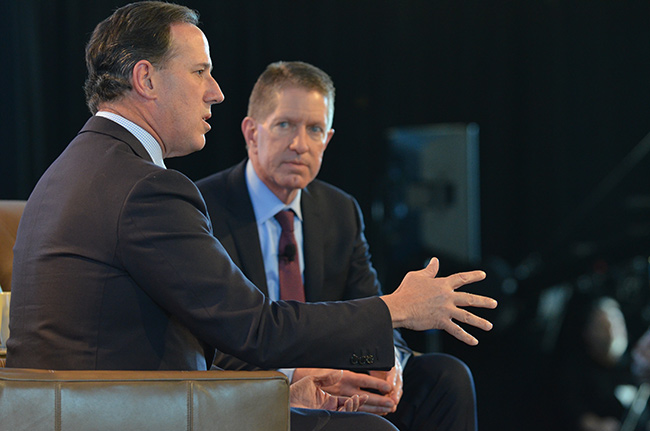 |
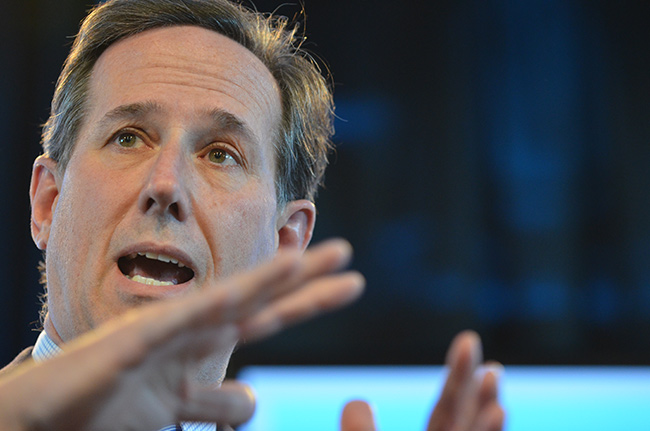 |
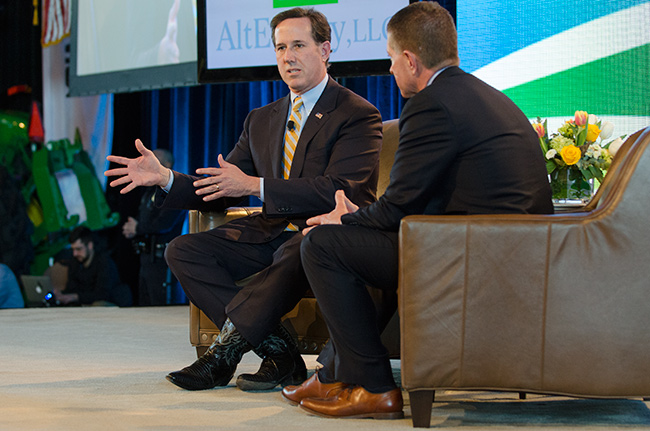 |
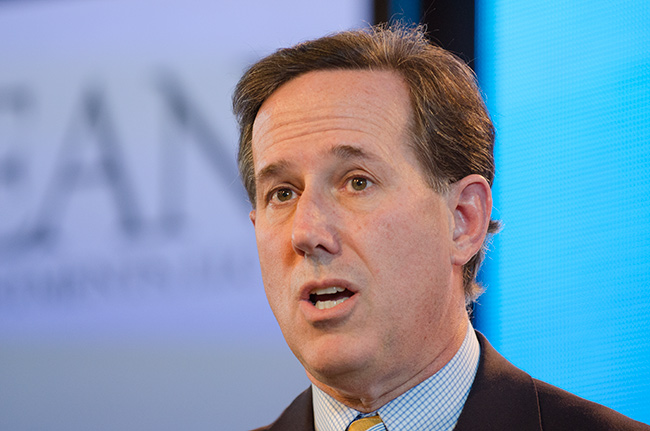 |
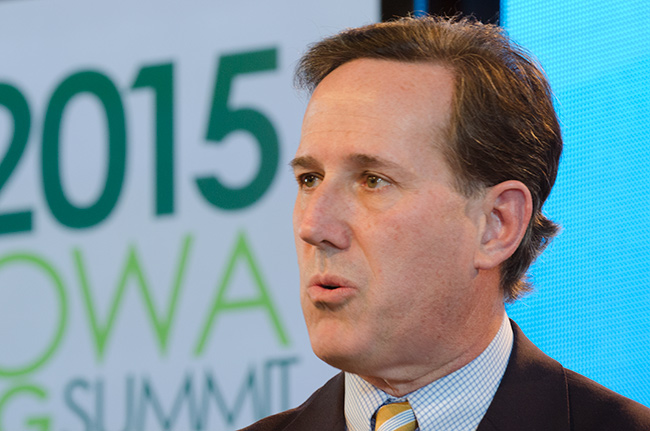 |
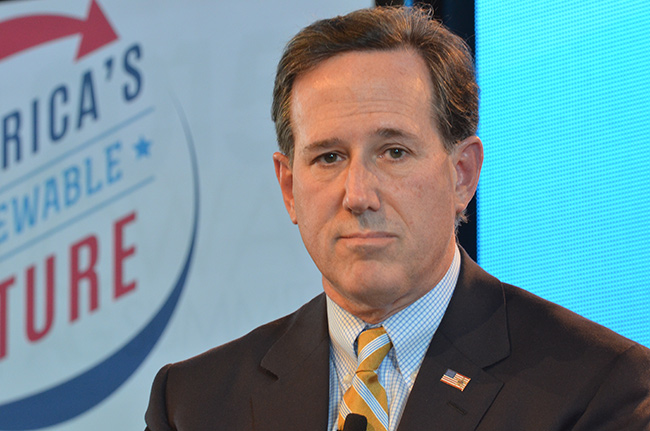 |
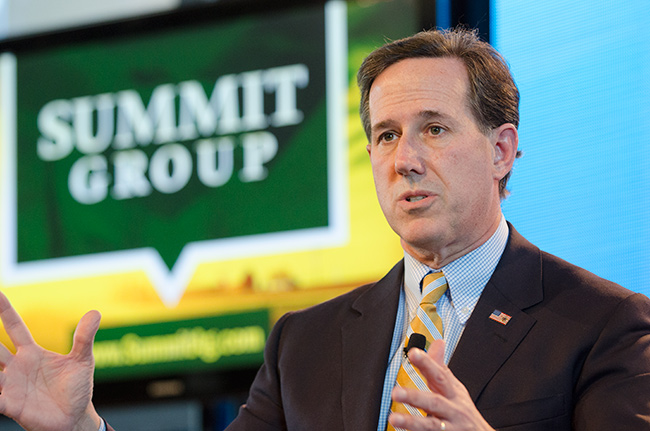 |
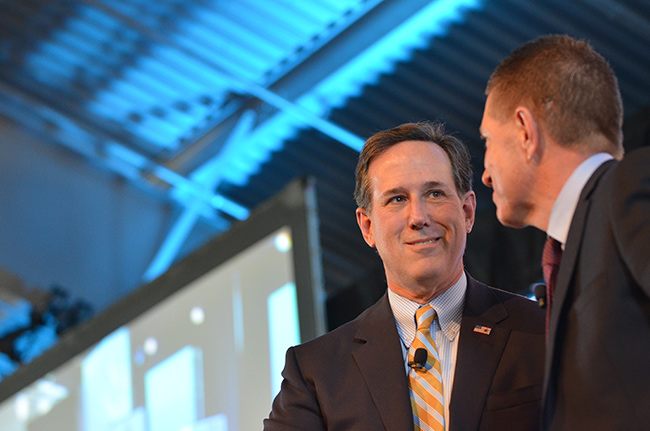 |
| Responses
on
RFS
and wind: Rastetter: You've been a strong supporter of the RFS. Why? Santorum: Oh, a whole laundry list of reasons. I'll throw the reason I suggested before which is the importance to rural America, and it is very important in rural America. It's important in my state of Pennsylvania; it's important. We have ethanol plants in Pennsylvania, I don't know; you probably know how many states they have them in, but a lot of states across the country. I support it number one because liquid fuels historically has been a big problem for us in this country from a national security perspective. I, as you know from the last time I ran, I ran on a program called Made in America, which is invest in American manufacturing and processing, try to reclaim our industrial heritage and make more things here, be more energy independent, be more independent from the standpoint of our national security in making our national security products here in America. All of the things that come from freedom and independence and putting people to work here in America again. If you just look at the reality of the middle of America hollowing out, wages stagnating even as unemployment rates are going down, wages are still stagnating and dropping. Median income in this country is falling. Why? Because we are not producing products and services that are high value services and that goes to manufacturing and processing and the key to that is energy. So energy independence is the key and so one of the reasons I supported the RFS was from a national security perspective so we could have a domestic source of liquid fuels here in America. So that's number one. Number two because it's a product that has shown over the years to have become efficient-- It's amazing to me as we've seen the tremendous innovation that's gone on, the continuing innovation to-- Every time, I remember in the last campaign--well not that we're in a campaign--but the last campaign [laughter] that. I'm just clarifying, the FEC is watching, just so you know this--that in the last campaign you know I'd go to New Hampshire and I would get hit every time, and you guys need to know this, they'd say oh it takes more energy to produce ethanol, you've probably heard this a million times, right? Well, that's not true. And so one of the things that I felt was really important was to get out there and say how important it is to show how efficiient ethanol has become, how important it is from the standpoint of an oxygenate and to improving octane ratings, all of the things that ethanol can bring to the table I just thought was an important thing, and it creates jobs in small town and rural America, which is where people are hurting. We have to look at where people are hurting in America and have policies to make sure that they have that ladder to climb to the top... Rastetter: ...So here does wind energy fit into that? Santorum: I support wind-- As you know the RFS is a mandate; it is not a tax subsidy. Rastetter: ....but you articulated pretty well, why do we, or the industry, or anyone have trouble understanding market access and if we didn't have the RFS we'd be mandated to use oil? Santorum: Well, thank you for bringing that up... Market access...it isn't hard to understand. I mean you have energy companies that are vertically integrated and as a result of that vertical integration they want to deny access-- Look they pump this oil out of the ground and they want to put it into vehicles and so you having that access is a very important part of that. It's not hard to understand. It's an important part of the reason for the RFS and it's also an important part of understanding the energy mix when it comes to renewable energies because as-- I mean I read an article just a few months ago from some of the power companies complaining about the RFS, calling for the end of the RFS [ed. not clear...does he mean the wind tax credit?], saying, you know, this is a burden on the power companies and you read the article and you can say well you know what they might have some legitimate concerns with the amount or the dollar amount, the amount of the credit and given energy prices today, which as you know, thanks be to God because of fracking and other sorts of energies that we've seen energy prices stabilize in this country and actually come down, and so we, I think you have to look at the wind tax credit and say you know we have to adjust it based on market conditions. And the fact that the Administration has frozen on this, I suspect for political reasons, and not be willing to put forth you know what they want to do, whether they want to extend it, how they want to extend it, to work with Congress, I know this is a big step for the Administration, to actually try to engage Congress and say it's now expired again. Is there a path to where we can extend this, phase it out potentially or lower it so we can get more support, bipartisan support to have this continue. But those are things that as a president you need to do and you need to have an industry, we're doing the same thing with ethanol--the president hasn't acted on ethanol either. And you have to have predictability; you can't have these programs in place and have them, as what happened with the ethanol subsidy, just go away. You can't start something with a government program and then just sort of pull the rug out from under it without having a, an adjustment period of time and I think that's what leadership would do. |
| <
Previous | Next > |

